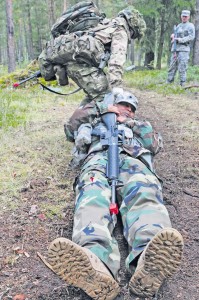GRAFENWÖHR, Germany — Deep in the woods of the Grafenwöhr Training Area, an Army medic runs smack into simulated enemy fire.
He responds quickly by dropping to the ground and aiming his rifle toward a thicket of oak trees. Twenty yards in front of him, his battle buddy has taken a bullet to the leg and writhes in pain. The medic must make his way to his buddy, dress the wound and drag him to safety.
Sound exhausting? This is just one of the many field scenarios Army medics must maneuver through with proficiency in order to earn the highly coveted Expert Field Medical Badge.

This year’s U.S. Army Europe-sponsored EFMB event attracted more than 260 candidates — 40 of them from nine European countries — for five rigorous days of physical and mental testing Sept. 4 to 8. Keeping candidates fueled for the diverse challenges they confront during EFMB competition falls onto the deft hands of 15 Army cooks, who are cutting a different approach to the standard three-meals-a-day menu.
“We see Soldiers as athletes and food as fuel. So, how can we fuel the athlete better?” said Capt. Ben Wunderlich, a registered dietitian with the 212th Combat Support Hospital, 30th Medical Brigade, 21st Theater Sustainment Command — the unit responsible for organizing this year’s EFMB event. “Our goal out here is to increase cognition and decrease fatigue.”
Athleticism was on full display when candidates began arriving in Grafenwöhr Aug. 23 for 12 days of familiarization training followed by five days of evaluation. Each morning, candidates walked with 30-pound rucksacks from their barracks to the various combat testing lanes, where they drilled through the litany of medical tasks spelled out in step-by-step format in the 147-page U.S. Army Medical Department Pamphlet 350-10. When candidates weren’t sleeping, walking or maneuvering through a lane, they were buried in this pamphlet.
Remembering to eat is probably the last thing on candidates’ minds. That’s where Wunderlich comes in with his team of culinary experts plucked from various Germany-based units, including the 212th CSH out of Bruchmühlbach-Miesau, the 16th Sustainment Brigade out of Baumholder, and Headquarters Troop, Regimental Support Squadron, 2nd Cavalry Regiment out of Vilseck.
With Wunderlich overseeing operations at two separate dining facilities — one for the hundreds of candidates and the other for the more than 300 support staff — cooks prepared upwards of 2,100 meals a day. That, of course, included the normal fare of breakfast, lunch and dinner. Also sprinkled throughout the day were two primary snack meals, which were prepared and delivered to candidates directly in the field. Cooks also offered a third snack that was served between 11 p.m. and midnight to those candidates practicing the nighttime land navigation portion of the test.
“Everything we make is fresh,” said Pfc. Alexander Neyens, a baker at the 16th SB Dining Facility in Baumholder. “We incorporate a lot of whole wheat flour into our products. We also try to use less sugar by adding a fruit and using that sugar in our products.”
All snacks included a complex carbohydrate, such as potatoes, fresh-baked pretzels or whole-wheat crust pizza, a protein or dairy source, such as lean ground turkey or a carton of milk, sliced fruits, and vegetables.
“With most Army rations, you get three large meals a day, and it just brings all that blood to the gut and slows everything down,” Wunderlich said. “What we want to do is provide five meals a day spread about three hours apart in moderate portions to make sure (candidates) stay at their peak performance.”
So, just how many calories were candidates burning? Wunderlich estimates that with all the physical exertion required to run through the lanes, coupled with the mental activity (yes, the brain does burn calories), candidates easily expended between 3,600 and 4,700 calories a day.
“If you aren’t starting off at full, it’s hard to get through the day,” said Sgt. Sonja Williams, NCO in charge of behavioral medicine at the Baumholder Health Clinic. She participated in her first EFMB event. “The lanes are demanding because you have to move at a fast rate and lift ‘simulated patients.’”
And those dummies weren’t light either; they weighed between 140 and 165 pounds, said Sgt. 1st Class Jeffrey Ebert, NCO in charge of behavioral health at the Bavaria Medical Department Activity, who helped run this year’s testing lanes.
“CTL One” alone, for example, consists of three warrior tasks, three evacuation tasks and 14 medical tasks, he said.
“Going through the lane, some of the medical tasks on the performance measures have seven to 10 pages worth of tasks (candidates) must do in sequence,” Ebert said. “Just knowing when to check a pulse or when to apply a tourniquet to control bleeding in order to triage properly can be mentally taxing.”
Wunderlich estimated that by the time the EFMB event wrapped up with the graduation ceremony Sept. 9, candidates will have walked, between the barracks and the testing lanes, around 38 miles. Add to that the 12-mile required ruck march and the nighttime land navigation portions of the test, and in the end, candidates will have covered a distance of nearly two marathons.
With so much emphasis on nutrition at this year’s EFMB event, one of three components that make up the Army Performance Triad (the others being sleep and activity), Williams said she certainly appreciated all the healthy food she received. But there’s one thing she said she absolutely could not live without.
“I got to have my coffee,” she said.


